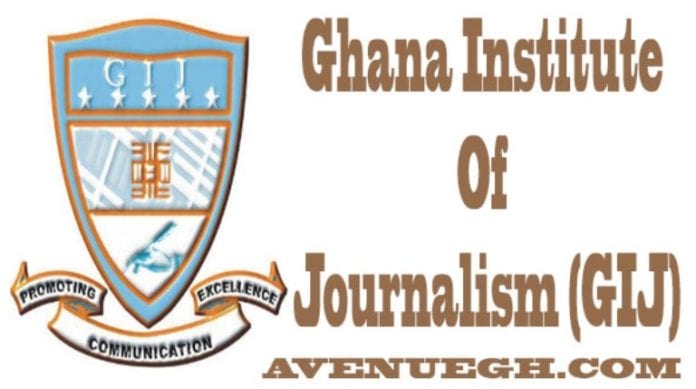If you are among those seeking to thrive in the journalism space, then the Ghana Institute of Journalism (GIJ) is just the place for you. GIJ is one of the earliest institutions of higher learning founded by the late president of Ghana, Kwame Nkrumah. Relative to others of a similar ilk, this certified institution is unique with state-of-the-art facilities, experienced speakers and instructors that have expertise in the field, and a welcoming learning environment. The institute offers many journalism courses that are open to both Ghana indigenes and international students. Most students of GIJ are experienced journalists already engaged in the media; this arrangement offers the students an invaluable opportunity to gain more experience from their peers.
GIJ’s fee structure has been outlined in this piece and from what is obvious, the fees payable by the local students are quite different from what international students are to pay. The school has also outlined payment-friendly modes that will allow the students to pay up their fees in two separate installments. The first installment usually comes in during the first semester, followed by the second installment in the second semester.
The Ghana Institute of Journalism’s Programmes of Study (Diploma and Undergraduate Level)
- Diploma in Communication Studies (Two-year)
- B.A. in Communication Studies (Four-year)
- B.A. in Communication Studies (Weekend and Top-Up) for GIJ diploma graduates (Two-Year)
Diploma in Communication Studies
Under this programme, we have communication, art subjects, and social sciences. Students have the chance to develop their potentials in any specialized communications area of their choice. Upon graduation, they may decide to go for further academic qualifications or can be employed as professionals in radio, television, wire service, online journalism, print media (magazines and newspapers), advertising, public relations, and marketing.

Bachelor of Arts in Communication Studies
This degree programme offers several media-focused courses blended with the social science cum arts education. It enables the enrollees to merge study areas from the arts and social sciences with practical and theoretical communication studies. The essence of this programme is to offer undergraduate students a professional choice in journalism or public relations. Because of that, all the students who are seeking to acquire a B.A. degree in Communication Studies ought to pursue one of the under-listed two sequences.
1. Journalism: Under the broad heading of journalism, we have two fields: Print and Broadcast Journalism. The programme is targeted to equip enrollees with the skills to pursue careers in broadcasting, photo-journalism, online journalism, and print media.
2. Public Relationship: This PR programme comprises Public Relations, Marketing, and Advertising, and prepares its enrollees for careers in corporate relations management, public affairs, and community affairs practice. Also, the graduates can work in marketing, advertising, customer services, and more.
Two-Year Bachelor of Arts in Communication Studies (Top-Up)
The Ghana Institute of Journalism also runs a two-year Bachelor of Arts in Communication Studies programme that starts from Level 300. Its main objective is to afford GIJ’s past students who are holders of the Diploma certificates to further their academic qualifications in Communication Studies.
Short Courses (Certificate Courses) Available at GIJ
GIJ also offers certificate courses in communication-related areas. These areas are open to practitioners as well as the general public. They include:
- Radio and Television Presentation
- Public Relations, Advertising, and Marketing
- Advanced Public Relations
- Advanced Advertising
- Advanced Communications
- Broadcast Journalism
- Advance Marketing
- Action and Strategic Planning
- T.V. Journalism
- Radio Journalism
- Writing Skills
- Photo-Journalism
- Events Management
- Contemporary English Language
- Customer Care
- Writing for Newspapers & Magazines
- Effective Public Speaking, Speech Writing, and Presentation
Post Graduate Studies Offered at GIJ
The Master’s programmes obtainable at the Ghana Institute of Journalism are
- M.A. Journalism
- M.A. Public Relations
- M.A. Media Management
- M.A. Development Communication.
M.A. in Journalism
This is a Master of Arts programme designed by the Ghana Institute of Journalism to run for a period of 12 months. The main focus of the program is to train professionals from different backgrounds to apply/utilize the models and concepts of journalism within the confines of the extensive social science traditions of the mass media and communication.
M.A. in Public Relations
Similar to the M.A. in Journalism, GIJ’s M.A in Public Relations is also designed to run for 12 months. The programme is focused on developing the manpower potential of professionals in utilizing public relations approaches and strategies in their diverse organizations. A second aim of the programme is to bridge the intellectual gap.
M.A. in Media Management
Postgraduate programmes in media management are likened to a virgin ground ready for tapping as it is not available at the local level. Upon its implementation, the programme will offer higher skills acquisition as well as knowledge to the practitioners who are already managing the media; besides, it will benefit the future generation of practitioners in the media who are aspiring to become media managers and owners.
M.A. in Development Communication
This is a highly specialized field in communication whose main focus is to fill a professional and intellectual gap identified in national and educational development.
Fees Payable at Ghana Institute of Journalism
The fees expected to be paid by students of GIJ have been broken down into different programmes. To know the amount payable for each course, students can visit the institution’s portal for the current fees. The most recent ones include:
Fees For Diploma in Communication Studies
| S/N | YEAR | GH(¢) | GH(¢) | GH(¢) |
| 2. | FIRST YEAR | 2,310.00 | 2,660.00 | 2,900.00 |
| 3. | SECOND YEAR | 2,310.00 | – | – |
Fees For the Current Academic Year (B.A in Communications)
| S/N | Level | Regular 2020/2021 (GH¢) | Evening 2020/2021 (GH¢) | Weekend 2020/2021 (GH¢) |
| 1. | Level 100 (Fresh Students) | 2,520.00 | – | – |
| 2. | Level 200 | 2,520.00 | – | – |
| 3. | Level 300 | 2,520.00 | – | – |
| 4. | Level 400 | 2,520.00 | – | – |
| 5. | Level 300 (Top-up) Fresh Students | – | – | 3,100.00 |
| 6. | Level 400 (Top-up) | – | – | 2,730.00 |
Fees For Postgraduate Programme MA
| S/N | Regular Programme | Weekend Programme |
| 1. | GH¢ 10,500.00 | GH¢ 13,000.00 |
Fees For Foreign Students
| S/N | Year | Fees |
| 1. | Degree (Fresh ) | $4,410.00 |
| 2. | Degree (Continuing) | $4,200.00 |
| 3. | Diploma (First Year) | $3,360.00 |
| 4. | Diploma (Second Year) | $3,150.00 |
| 5. | Post Graduate Programmes | $5,250.00 |
Mode of Payment For All the Fees At The Ghana Institute of Journalism
- The fees for undergraduate students are to be paid into the GIJ’s Fidelity Bank account number 1070031304406.
- Students for postgraduate studies should pay through Zenith Bank with the account number 6010160472.
- For fresh students, those in Level 100, Top-Up 300, and Diploma One are expected to pay up to 80 percent of their entire fees during the first semester. The remaining 20 percent will have to go in before the commencement of the second semester registration.
- Continuing students should pay up 60 percent of their entire fees before commencing their first-semester registration and the remaining 40 percent should be paid before second-semester registration.
- All Ghana Institute of Journalism students are mandated to pay an SRC fee of GHC50.00, plus GHC40.00 for their SRC souvenirs; this money will go into the institute’s fidelity account with the number 1070031863612.
